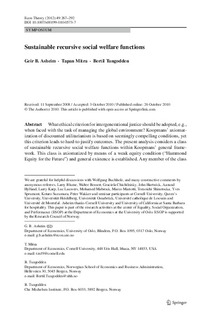| dc.contributor.author | Asheim, Geir B. | |
| dc.contributor.author | Mitra, Tapan | |
| dc.contributor.author | Tungodden, Bertil | |
| dc.date.accessioned | 2012-10-18T12:57:09Z | |
| dc.date.available | 2012-10-18T12:57:09Z | |
| dc.date.issued | 2012 | |
| dc.identifier.issn | 0938-2259 | |
| dc.identifier.issn | 1432-0479 | |
| dc.identifier.uri | http://hdl.handle.net/11250/162653 | |
| dc.description.abstract | What ethical criterion for intergenerational justice should be adopted, e.g., when faced with the task of managing the global environment? Koopmans’ axiomatization of discounted utilitarianism is based on seemingly compelling conditions, yet this criterion leads to hard-to-justify outcomes. The present analysis considers a class of sustainable recursive social welfare functions within Koopmans’ general framework. This class is axiomatized by means of a weak equity condition (“Hammond Equity for the Future”) and general existence is established. Any member of the class satisfies the key axioms of Chichilnisky’s “sustainable preferences”. The analysis singles out one of Koopmans’ original separability conditions (his Postulate 3′a), here called “Independent Present”, as particularly questionable from an ethical perspective. | no_NO |
| dc.language.iso | eng | no_NO |
| dc.publisher | Springer | no_NO |
| dc.subject | intergenerational justice | no_NO |
| dc.subject | sustainability | no_NO |
| dc.subject | discounted utilitarianism | no_NO |
| dc.title | Sustainable recursive social welfare functions | no_NO |
| dc.type | Journal article | no_NO |
| dc.type | Peer reviewed | no_NO |
| dc.subject.nsi | VDP::Social science: 200::Economics: 210::Economics: 212 | no_NO |
| dc.source.pagenumber | 267-292 | no_NO |
| dc.source.volume | 49 | no_NO |
| dc.source.journal | Economic Theory | no_NO |
| dc.source.issue | 2 | no_NO |
| dc.identifier.doi | 10.1007/s00199-010-0573-7 | |
